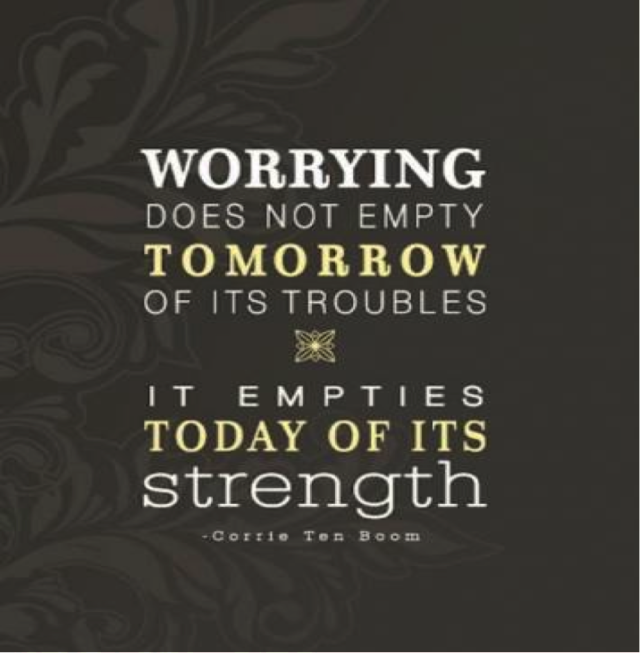
Worrying
 “What” and “if” are two simple words. But when you put them together, the amount of stress, frustration, worry, and unnecessary anxiety is overwhelming. We spend countless hours worrying about “what if’s” in our lives: Worst case scenarios, the perfect outcome and every possible consequence in-between. So, how much of this mental training pays off? Almost none of it.
“What” and “if” are two simple words. But when you put them together, the amount of stress, frustration, worry, and unnecessary anxiety is overwhelming. We spend countless hours worrying about “what if’s” in our lives: Worst case scenarios, the perfect outcome and every possible consequence in-between. So, how much of this mental training pays off? Almost none of it.
Spending your energy worrying about the negatives, worst-case scenarios, and potential failures solves nothing. The only value (arguably) accomplished is short-lived preparation for a myriad of outcomes. While you may think that all that planning for disaster helps you, in the end the feeling of helplessness just causes stress. Life lays out limitless outcomes for situations. Since your life is constantly changing, you are overrun with thoughts of potential outcomes.
I’ll be the first one to admit staying focused and positive is not always easy. My family is now in the process of selling our home. During the offers and counter-offers this week, I realized I was getting caught up in the cycle of “what-if’s,” allowing myself to rotate through various negative outcomes: What if the buyer can’t secure financing? What if my home doesn’t appraise correctly? What if the buyer cancels during the 10 day look period? All of these what if’s are completely beyond my control. I am not the lender. I am not the appraiser. I am not the buyer. Spending time worrying about the worst-case scenario does nothing other than create negative energy. So, instead, I have to re-focus, and let go. All I can do is concentrate on what I can actually control. That includes staying positive and focusing on the outcome I want – a sold home regardless if it’s this buyer or another one – and letting go of everything I cannot control.
The game of “what-if’s” means fear is controlling you. Fear leads to worry. Worry leads to bad decisions. Bad decisions typically create negative outcomes. While some may like the “see-I-told-you-so” routine and outcome (which you just created by all those negative thoughts and projected outcomes), I suggest your life will be less hectic, less stressful, and less anxious if you choose to take control over the game.
Recognizing the mental game of “what-if,” and the control it has on our thoughts and stress levels, is the first step. Don’t try to mentally solve all the “what-ifs” that pop up. Divert that energy into realizing you are getting caught up in the “there’s never a winner” game, then focus on pushing the negative thoughts aside. Remind yourself that you cannot control all outcomes. Do what you can to drive toward your desired outcome. Stay positive and focus your thoughts only on that outcome – not the innumerable negative, worst-case scenarios.
Stop spending your time on the what-ifs. Most will likely never happen. Instead, ask yourself relevant and appropriate questions about situations, act in positive ways that are in your direct control, have a contingency plan in case something realistically adverse does happen, and then stay focused on your desired outcome. Stop worrying!





